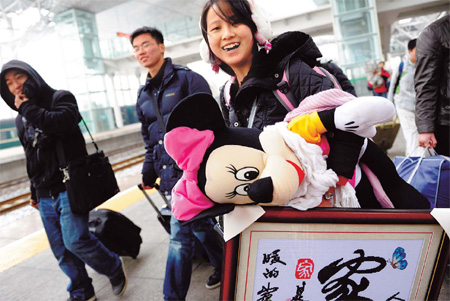Society
Rising cost of returning home for Spring Festival
By Cao Li in Beijing and Li Xinzhu in Shanghai (China Daily)
Updated: 2011-01-31 07:03
 |
Large Medium Small |
Much symbolism
Giving money is a Chinese tradition for young people to show gratitude and respect as well as provide a financial subsidy to their families, especially in rural regions where the economy lags far behind cities. In cities such as Beijing and Shanghai, where most university graduates go for opportunities, the average disposable income is around 30,000 yuan a year, about three times the amount in rural regions.
Yu Hai, a sociology professor with Shanghai's Fudan University, said that to the Chinese gift giving is an investment to build up connections, within the family or outside it. For white-collar workers who live in one place and have family in another, the spending doubles and the expectations, due to the widening wealth gap, are high.
"For many, it is a way to compensate for their absence with the family and the extended families at home," Yu said. And it is a way for their families to show to their neighbors and villagers the success of the young generation in the city.
"They have received a high education and settled in big cities," said Xu Anqi, a sociologist specializing in marriage and family study with Shanghai Academy of Social Sciences. "Their families are proud of them and have high expectations of them. And their relatives believe they are living a much better life. They have to return home in glory."
The tradition has been carried on for generations, Yu said. The problem for today's younger people is that they live under high pressure in the cities, and the tradition only exacerbates the situation. And it becomes more of a burden when the amount of money is interpreted as the amount of gratitude.
"According to our hometown tradition," Yi said, "you will have to give money (to the family) when you go home during the New Year. And men give more than women. Otherwise my parents will lose face in front of the relatives."
To some, the face-saving work also means buying a handbag for a sister-in-law, subsidizing a mortgage for siblings and paying tuition for a younger generation, according to posts at tianya.cn. They will be called stingy if the red envelopes are slim.
For many who have either just started a career with a meager income or who are struggling to pay for their own home due to soaring prices, big-city life is far from glorious. In a 2010 Mercer's survey of the world's most expensive cities, Beijing, Shanghai, Guangzhou and Shenzhen were listed as Nos 16, 25, 38 and 42.
Hua Xu and Fang Jingjing have just moved into a small apartment in suburban Shanghai, and they spend two hours traveling to work every day. To pay for the mortgage and the home visit for the New Year, the couple plans every cent well.
As an editor at a car magazine, Fang wears nothing comparable to the fashionable and luxurious style of her publication. And when Hua, an IT engineer who specializes in banking system applications, broke his 180-yuan glasses recently, he had them repaired rather than replaced.
They know only too well how much financial pressure they will face after the New Year, but Fang said they "have been expecting the day (to return) for a whole year. The idea gives us strength to conquer the loneliness and difficulties we suffer in the city."
